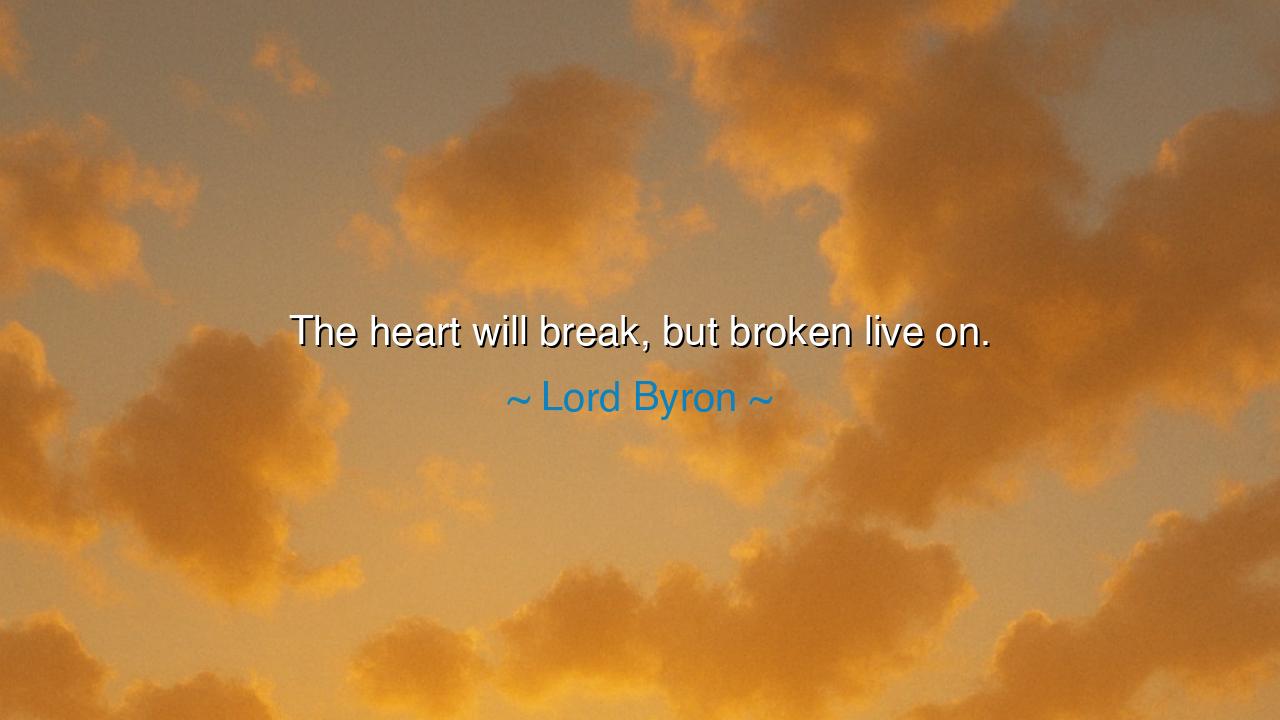
The heart will break, but broken live on.






“The heart will break, but broken live on.” So wrote Lord Byron, the poet whose verses were steeped in fire and sorrow, whose life itself was a tempest of passion, love, and loss. In this simple but piercing line, he unveils the truth that to be human is to suffer heartbreak, and yet to endure. The heart—that tender seat of love, hope, and longing—was never fashioned to remain unscathed. It will be broken by death, by betrayal, by disappointment. Yet even shattered, it continues to beat, to live, to carry the burden of its scars. This is both our tragedy and our triumph.
The ancients knew this truth and wove it into their myths. Orpheus lost Eurydice, and his heart broke in the moment he looked back. Hector fell beneath Achilles’ spear, and Andromache’s heart cracked with grief, yet she lived on to raise her child in the shadow of Troy’s ruins. The wisdom is this: life does not halt for broken hearts. They continue, wounded yet enduring, reshaping themselves around the absence, the loss, the emptiness. The broken heart is not the end of life but the beginning of transformation.
Consider the life of Abraham Lincoln, who, before leading a fractured nation, bore his own fractures within. The death of his son Willie cast him into despair so deep that he thought he might not recover. His heart was broken. And yet he lived on, and from that brokenness grew a well of compassion that guided him through the Civil War. His leadership was not forged in unbroken joy but in sorrow endured. Thus Byron’s words echo: the heart will break, but broken live on.
Even Lord Byron himself embodied this truth. His own life was riddled with failed loves, exile, and scandal. Yet he carried his wounds into his art, and his broken heart gave the world poetry that still burns with intensity centuries later. His heart was not unbroken, but because it lived on, the world inherited beauty from his suffering. Thus he reminds us that a broken heart does not silence life—it reshapes it into something new, often deeper and more enduring.
O children of tomorrow, do not despair when your heart breaks. It will—this is certain. No life escapes sorrow, no soul is spared the crack of grief. But when it happens, remember Byron’s wisdom: broken does not mean destroyed. The heart can live on, bearing its scars like sacred marks. Indeed, those scars may be the very source of your future strength, your compassion, your wisdom.
The lesson is plain: you will be broken, but you will not be ended. Practically, let each person do this: when loss comes, do not demand that the heart be whole again; instead, learn to live with its brokenness. Find meaning in your sorrow, as Lincoln found compassion, as Byron found poetry. Let the pain deepen your humanity, not embitter it. Seek others, for broken hearts heal best when they share their stories together. And remember: even the shattered heart beats on, and each beat is proof of resilience.
Thus hold Byron’s words close: “The heart will break, but broken live on.” Let them be a reminder in the night of grief that survival itself is victory, that life continues, and that meaning can be remade even in sorrow. For in enduring heartbreak, you join the eternal lineage of humankind—those who have suffered, wept, endured, and still walked forward into the dawn.






AAdministratorAdministrator
Welcome, honored guests. Please leave a comment, we will respond soon